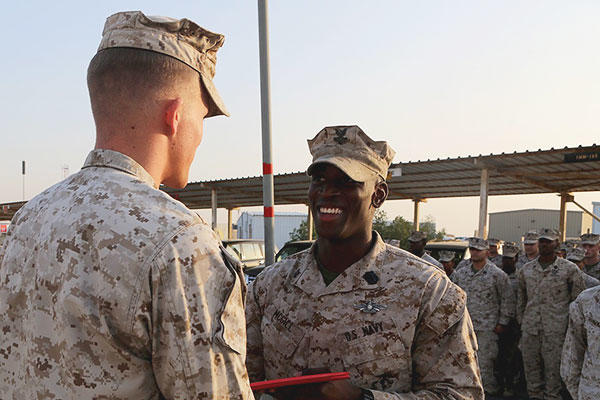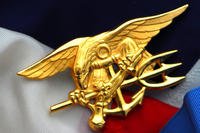SOUTHWEST ASIA, December 21, 2015 — U.S. Navy Petty Officer 2nd Class Ambrose McGill, a hospital corpsman assigned to Special Purpose Marine Air-Ground Task Force Crisis Response-Central Command, earned his Fleet Marine Force Warfare insignia, Dec. 12, 2015, after completing demanding hours of dedicated study, practical applications and evaluations.
The rigorous course, designed to help sailors better understand their partner service, includes lessons about the Marine Corps ranging from Corps knowledge to infantry tactics. The FMF pin is awarded to sailors who show an ability and willingness to learn the next level of warfighting to more effectively support the mission of the Marine Corps.
From the day he arrived at his unit, McGill said he worked hard to earn his pin because it not only allows him to become more tactically proficient at his job, but it also gives him deeper insight into his unit.
"It's quite an honor, I've been with the Marine Corps for almost five years now and this has been something I've wanted to achieve since the first day I became a hospital corpsman," he said. "This is the biggest achievement in my entire career."
The arduous curriculum involves mastering approximately 400 pages of knowledge ranging from land navigation to the significance of distinguished Marines, such as Dan Daly. To qualify, a sailor must serve one year with an active-duty Marine Corps unit — or two years for reserves — pass a written test and the Marine Physical Fitness Test, and demonstrate skills used in service with the Marines such as weapon breakdown and familiarization, land navigation, combat communications. The final hurdle is an oral examination by senior enlisted sailors who are FMF qualified.
"This qualification says that you are qualified to serve with the fleet Marines and take care of the 'Devil Dogs,'" Chief Petty Officer Casey Wheeler, the Navy senior enlisted leader with SPMAGTF CR-CC,said. "There is a vast amount of pride that comes with earning this pin."
McGill said he spent months dedicated to earning the FMF pin.
"It's good to be a great sailor, but it's better to go above and beyond," he said. "To sacrifice the additional hours to learn the extra knowledge and do everything you can to be proficient and an expert — not only in your job, but also in the Marine Corps traditions and various tactical areas — is something people should strive to achieve."
McGill said he is happy to be part of a community of sailors who have earned the right to wear the FMF pin.
Related video:


























